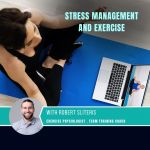Stress Management & Exercise
“Physical Activity has always been known to have a positive impact on our mental health as regular bouts of exercise relieves stress.”
What is stress?
Stress is how our body responds to pressure. Often, stress is triggered through new events, unexpected times, and situations where we feel we have little control.
In 2020-2021, 15% of Australians aged 16-85 years experienced high or very high levels of psychological stress, in the 16–34-year range 20% of these individuals experienced high levels of psychological distress. (ABS, 2021).
How to know if you are feeling stressed?
Here are some common signs and symptoms:
- Anxious
- Afraid
- Angry or Aggressive
- Sad
- Irritable
- Frustrated
- Depressed
How MUCH exercise DO I NEED TO DO to manage high levels of stress?
The American College of Sports Medicine (ACSM) recommends that adults exercise for 150 minutes a week at a moderate intensity, meaning a 30-minute walk 5 times a week and to add on 2 resistance training sessions per week for all major muscle groups in the body.
What’s the science behind exercise and stress?
1. Pumps up your Endorphins
Physical Activity releases the neurotransmitter ‘Endorphins’, the brain’s feel-good chemical.
2. It reduces negative effects of stress
Exercise provides immediate and chronic stress relief as it imitates the effects of stress by initiating the ‘fight or flight’ response. This leads to a positive impact on your body, by boosting your immune, digestive, and cardiovascular systems.
3. It improves your mood
Regular exercise enhances self-confidence, elevates your mood, and lowers the negative symptoms associated with depression & anxiety.
“our EXERCISE PHYSIOLOGISTS ARE EXPERTS IN PRESCRIBING EXERCISE PROGRAMS To OPTIMise your mental and physical wellbeing”
Starting an Exercise Program can be tricky, how can I begin and stay consistent?
1. Create SMART goals
Specific – They need to be specific to you and your needs.
Measurable – you need to be able to measure your results.
Achievable – It is feasible to achieve.
Realistic – We aren’t in a fantasy world, losing 10kg a day isn’t realistic. Timely – 6 weeks, 8 weeks, 6 months?
2. Find a friend
Why not find a friend? Why not go walking with a friend?
Research suggests that finding a companion in exercise increases adherence to an exercise regime.
3. Exercise in short bursts
Exercise for 30 minutes straight? Or break it up for three 10-minute bouts? Research suggests that initially breaking exercise into smaller intermittent bouts is just as effective as performing continuous exercise!
4. Try different modes of exercise
Be open minded and try as many exercises as you can! Give Pilates, boxing, and yoga a go. WHY? Because why not.
“our EXERCISE PHYSIOLOGISTS ARE EXPERTS IN PRESCRIBING EXERCISE PROGRAMS To OPTIMise your mental and physical wellbeing”
Book in now to see an Exercise Physiologist so we can help you live a healthy and happy life!


